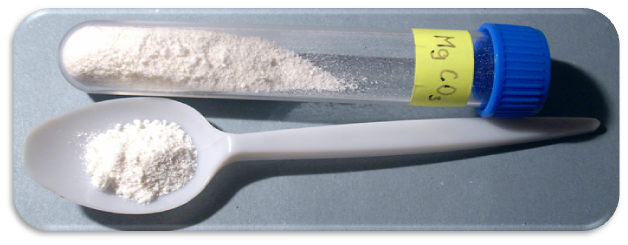Know Your Remedies: Magnesium Carbonicum (Mag-c.)
 Common Names: Magnesium carbonate; MgCO3; magnesia alba; Magnesite.
Common Names: Magnesium carbonate; MgCO3; magnesia alba; Magnesite.
General Information
Magnesium Carbonicum (Mag-c.) is a remedy for digestive problems, failure to thrive, and an oversensitive nervous system. Fatigue and weakness can be a problem with the whole body feeling tired but especially the legs and feet. ‘Sourness’ runs through many symptoms – emotional temperament and temper, and discharges such as saliva, perspiration, stool, vomit. Milk may disagree and symptoms often worsen at night – restlessness, anxiety, and pains. Children needing Mag-c can have gastrointestinal disorders and may be diagnosed as ‘failure to thrive’. They have trouble gaining weight and may be slow learning to read and write. Weak muscles with low tone are another common problem.
Mental-Emotional Symptoms
- Oversensitive, bad tempered or ‘sour’ disposition.
- Anxiety and dread for the future. Anxiety relieved once in bed at night.
- Sensitive to quarrels; peacemaker – wants peace and harmony.
- Forsaken feeling; fear of being deserted; feels unloved by family and friends.
Gastrointestinal/Digestion
- Gastrointestinal disorders.
- Liver disturbances leading to sourness.
- Greenish diarrhea – frothy, undigested, or like pond scum.
- Desire for meat and aversion to vegetables, or visa versa.
Limbs
- Tired, heavy feet.
Female
- Menstruation increases at night, or is only at night.
- Menstruation stops during the day or while walking.
Perspiration
- Perspiration with pains.
Sleep
- Feeling tired and unrefreshed for several hours on waking in the morning.
Where do I find it?
Magnesium Carbonicum (Mag-c.) is available from our online store as a single remedy in either pills or liquid.
Home Treatment Guidelines
Acute, Self-Limiting Conditions
Conditions like colds or minor injuries, which are short-term and typically improve on their own, can be managed at home with homeopathy. However, in emergencies or if symptoms worsen, contact your healthcare provider.
Chronic Conditions
These home treatment instructions do not apply for ongoing issues, whether mentioned above or not, like persistent allergies or chronic pain. You should consult a qualified homeopath for a personalized treatment plan to achieve the best results with homeopathy for chronic conditions.
How to Take the Remedy for Acute Conditions
- Take one pill or five drops of the remedy. The frequency depends on symptom severity. As examples:
- For life-threatening symptoms, take every 1 minute and seek emergency help immediately.
- For mild symptoms, take every 4 hours.
- Stop taking the remedy once you feel better. Resume if symptoms return.
- If no improvement after four doses, choose a different remedy or consult a professional homeopath.
- For more details on dosing, refer to: How Often to Dose with a 30C Homeopathic remedy.
- For information on the different potencies, read: Guidelines on which potency to use
Additional Notes From Past Masters
Homeopathy is a 200-year-old system of medicine. Early homeopaths recorded detailed notes on how remedies worked, including initial tests, remedy relationships, and their experiences. These writings were shared to improve homeopathic practice and now offer fascinating insights into past uses of homeopathy. Here’s an example, edited and modernised for clarity, from Leaders In Homoeopathic Therapeutics (1898) by E. B. NASH M.D.:
Leaders In Homoeopathic Therapeutics by E. B. NASH M.D.
Magnesium Carbonicum (Mag-c.)
Stools green and frothy, like the scum of a frog pond; doubling up colic > after stool.
Toothache in decayed teeth, worse at night; must get up and walk about for relief (especially during pregnancy).
Too exhausted nerves in worn-out women; what China is for loss of blood.
Menses flow only at night or when lying, and in absence of uterine pains.
* * * * *
The salts of Magnesia are not new to the medical profession as remedies.
Especially is the one under consideration so well known in its action upon the intestinal canal that it has for a long time been “my lady’s” habitual resort for sour stomach and constipated bowels.
Of course, then it should become a very useful remedy for diarrhœa in the hands of a Homœopathist, and so it is.
The kind of diarrhœa to which it is most applicable is -“Stools green and frothy like the scum of a frog pond.”
All of the Magnesias are great pain producers, consequently pain relievers, and, as might be expected, the stools of Magnesia carb. are preceded by griping, doubling-up colic.
So far as colic is concerned, sometimes it might be difficult to choose between Magnesia carb. and Colocynth, but the stools are not alike.
Rheum comes nearest to Magnesia carb., in that both have colic before stool, sour stool and sour smell of the whole body; but with Magnesia the green stool stands first and with Rheum the sourness.
The stool of Rheum is oftener dark brownish than green.
Chamomilla has green stool with much pain, but the stool is watery, while Magnesia carb. is more slimy.
Mercury has the slimy stool which may be green also; but with Mercury tenesmus is the leading symptom, and the mouth symptoms and sweat without relief under it are not like the other remedies.
Magnesia carb. has toothache which at first sight seems to simulate that of Mercury.
It comes in decayed teeth and is worse at night.
There is a finer shade of difference, however, that distinguishes them. Mercury is worse from the warmth of the bed (a general characteristic of Mercury), while Magnesia carb. is worse quiet.
The patient is obliged to walk about for relief.
This kind of toothache is common among pregnant women, and I have often cured it. (Ratanhia.)
I have used it in the 200th potency for this trouble. Have used it lower in diarrhœas.
I once cured a severe case of coccydynia, a case of long standing.
The pains were sudden, piercing, causing the patient to almost faint away. Magnesia carb. 200th cured promptly.
Lobelia inflata has extreme sensitiveness; sits leaned forward to avoid contact of even soft pillow.







